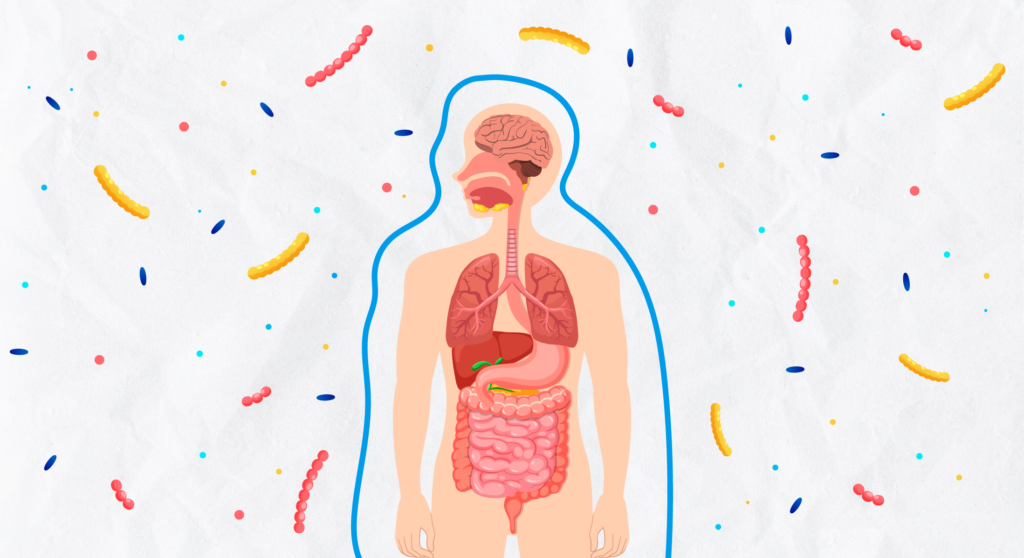The human body is a complex ecosystem filled with a diverse array of microorganisms that play a crucial role in maintaining overall health. While the gut microbiota is often in the spotlight for its impact on digestion and immune function, recent research has revealed that these tiny organisms have far-reaching effects beyond the gut.
The gut-brain connection has garnered significant attention in recent years, with studies showing that the microbes in our gut can communicate with our brain, influencing our emotions and stress levels. This bidirectional communication involves a complex interplay of the gut microbiota, the vagus nerve, hormones, immune cells, and metabolites. This connection has been linked to conditions such as dementia, autism, and other neurological disorders, although the exact nature of this relationship is still being explored.
Surprisingly, the gut microbiota can also influence lung health, with studies showing a connection between the gut and lung microbiota. This link may play a role in the development and exacerbation of lung diseases such as asthma. Scientists are investigating how leveraging commensal microbes in the lung can help predict and manage asthmatic flares, potentially leading to more effective treatments for respiratory conditions.
The immune system is heavily influenced by the gut microbiota, with up to 80% of immune cells residing in the gut. Researchers studying irritable bowel syndrome have found evidence of increased immune activation in the small intestine, suggesting that gastrointestinal issues are not solely psychological. Disturbances in the gut barrier can lead to localized allergic reactions and other symptoms, highlighting the intricate relationship between gut health and immune function.
The liver, another vital organ, is also affected by disruptions in the gut microbiota. When the gut barrier is compromised, harmful microorganisms and their byproducts can enter the liver, potentially leading to liver diseases. Scientists are exploring ways to modulate the gut and liver to mitigate these complications and improve overall liver health.
The skin, our body’s largest organ, is closely linked to the gut microbiota. Imbalances in the gut microbiome can weaken the intestinal wall, contributing to skin conditions such as eczema, psoriasis, vitiligo, and acne. Understanding this connection may lead to novel treatments for skin disorders that target the gut microbiota.
Finally, researchers are uncovering how the gut microbiota influences heart health, with elevated levels of trimethylamine N-oxide (TMAO) from the gut microbiota being identified as a marker for increased risk of heart disease. By modulating the gut microbiome and personalizing dietary advice based on individual gut profiles, scientists hope to develop targeted treatments for heart disease.
In conclusion, the gut microbiota plays a critical role in maintaining overall health, with far-reaching effects on various organs and systems throughout the body. By understanding and harnessing the power of these tiny organisms, researchers aim to develop new treatments and interventions that can improve health outcomes for a wide range of conditions. the topic of “The Benefits of Mindfulness in Daily Life”
In today’s fast-paced and stressful world, many people find themselves constantly on the go, juggling work, family, and personal responsibilities. This can lead to feelings of overwhelm, anxiety, and burnout. However, there is a simple practice that can help combat these negative feelings and promote overall well-being: mindfulness.
Mindfulness is the practice of being fully present and aware in the moment, without judgment. It involves paying attention to your thoughts, feelings, and sensations in a non-reactive way. By cultivating mindfulness in daily life, you can experience a multitude of benefits that can improve your mental, emotional, and physical health.
One of the key benefits of mindfulness is stress reduction. When you are mindful, you are better able to recognize and respond to stress triggers in a more calm and composed manner. By staying present in the moment, you can prevent your mind from wandering to past regrets or future worries, which can exacerbate feelings of stress and anxiety.
Mindfulness can also improve your relationships with others. When you are fully present and attentive in your interactions, you are better able to listen and communicate effectively. This can lead to deeper connections, increased empathy, and a greater sense of understanding and compassion towards others.
In addition, mindfulness can enhance your mental clarity and focus. By practicing mindfulness, you can train your mind to be more attentive and focused on the task at hand. This can improve your productivity, creativity, and problem-solving skills, as well as help you make better decisions in your personal and professional life.
Furthermore, mindfulness can promote emotional regulation and resilience. By cultivating awareness of your thoughts and emotions, you can learn to respond to them in a more skillful way, rather than reacting impulsively or out of habit. This can help you navigate difficult emotions, such as anger or sadness, with greater ease and grace.
Physical health benefits of mindfulness include reduced levels of inflammation, improved immune function, and lower blood pressure. By lowering stress levels and promoting relaxation, mindfulness can also contribute to better sleep quality, which is essential for overall health and well-being.
There are many ways to incorporate mindfulness into your daily life. You can start by simply taking a few minutes each day to sit quietly and focus on your breath, or by practicing mindful eating by savoring each bite of your meal. You can also engage in mindful movement practices, such as yoga or tai chi, to cultivate a sense of awareness and presence in your body.
In conclusion, mindfulness is a powerful practice that can bring about positive changes in your life. By incorporating mindfulness into your daily routine, you can experience a greater sense of peace, clarity, and overall well-being. So why not give it a try and see for yourself the transformative benefits of mindfulness in daily life.


